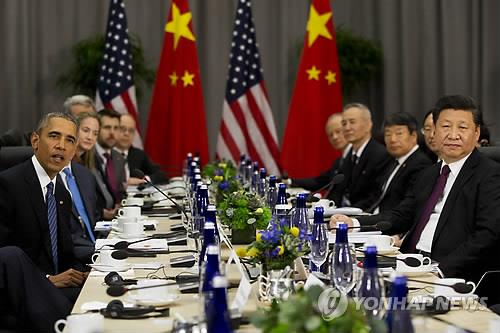- California Assembly OKs highest minimum wage in nation
- S. Korea unveils first graphic cigarette warnings
- US joins with South Korea, Japan in bid to deter North Korea
- LPGA golfer Chun In-gee finally back in action
- S. Korea won’t be top seed in final World Cup qualification round
- US men’s soccer misses 2nd straight Olympics
- US back on track in qualifying with 4-0 win over Guatemala
- High-intensity workout injuries spawn cottage industry
- CDC expands range of Zika mosquitoes into parts of Northeast
- Who knew? ‘The Walking Dead’ is helping families connect
Obama to visit China amid tensions over THAAD, South China Sea
WASHINGTON, Aug. 18 (Yonhap) — U.S. President Barack Obama will visit China early next month for a summit of the Group of 20 countries and bilateral talks with Chinese President Xi Jinping, the White House said Thursday.
The trip, set to begin on Sept. 2, comes as the U.S. and China are at odds over maritime disputes in the South China Sea and the U.S. plan to deploy the THAAD missile defense system in South Korea.
Obama will “conduct in-depth meetings with President Xi Jinping of China in Hangzhou, where the two leaders will discuss a wide-range of global, regional, and bilateral issues,” White House press secretary Josh Earnest said in a statement without elaborating.
During the G-20 summit, Obama “will emphasize the need to continue building on the progress made since 2009 in advancing strong, sustainable, and balanced global economic growth” while underscoring the “importance of G-20 cooperation in promoting a level playing field and broad-based economic opportunity,” Earnest said.
The G-20 summit is set for Sept. 4-5 in the southeastern Chinese city of Hangzhou. Obama’s trip will highlight his “ongoing commitment to the G-20 as the premier forum for international economic cooperation as well as the U.S. rebalance to Asia and the Pacific,” Earnest said.
After China, Obama will visit Laos for annual regional summits led by the Association of Southeast Asian Nations (ASEAN) — the U.S.-ASEAN Summit and the East Asia Summit — as well as bilateral meetings with Lao President Bounnhang Vorachith, the White House said.
China has strongly protested the decision by Washington and Seoul to deploy a Terminal High Altitude Area Defense (THAAD) unit in South Korea, saying the system, especially the powerful “X-band” radar, could be used against it, despite repeated U.S. assurances the system is purely defensive and designed only to cope with North Korean threats.
The issue has raised concern that China might be refusing to render full-scale cooperation for international efforts to increase pressure on Pyongyang, including implementing the latest U.N. Security Council sanctions resolution, in protest of the THAAD deployment decision.
After the North’s latest missile launches early this month, the U.S. sought to have the Security Council adopt a press statement condemning the firings, but those efforts fell through due reportedly to Chinese insistence the statement also include opposition to THAAD’s deployment.
The U.S. and China have also been at odds over China’s territorial claims in the South China Sea.
Last month, an international tribunal rejected China’s claims in a victory for the Philippines and other Southeast Asian nations locked in maritime disputes with Beijing. But China has rejected the ruling.












